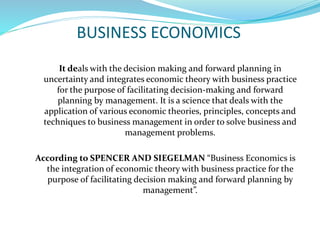How Government Regulations Shape Business and Economics on a Worldwide Scale
How Government Regulations Shape Business and Economics on a Worldwide Scale
Blog Article
Recognizing Economic Concepts for Better Organization Decision-Making
In the complicated landscape of modern-day company, a thorough understanding of financial principles can substantially improve decision-making procedures. The application of these economic theories commonly reveals unexpected difficulties and possibilities that can redefine tactical techniques.
The Essentials of Economic Theory
Economic theory functions as the structure for recognizing how individuals and organizations make selections in the presence of scarcity. At its core, economic theory analyzes the allowance of restricted sources to please endless desires. This basic concept of scarcity necessitates trade-offs, compelling decision-makers to evaluate the costs and benefits related to various alternatives.
The two primary branches of economic theory are microeconomics and macroeconomics. Microeconomics focuses on individual agents, such as consumers and companies, assessing their actions and communications in details markets. It stresses ideas like supply and demand, cost elasticity, and market equilibrium, which are crucial for understanding just how rates are identified and how sources are distributed.
On the other hand, macroeconomics analyzes the economic situation in its entirety, resolving more comprehensive problems such as inflation, joblessness, and financial growth. It provides understandings right into systemic phenomena that influence all financial agents, guiding policymakers in crafting reliable economic strategies.
Ultimately, a solid grounding in financial theory is important for reliable service decision-making. By comprehending the concepts of shortage, trade-offs, and market characteristics, organizations can much better make and navigate complicated environments educated choices that boost their competitive benefit.
Secret Economic Indicators
Key financial indicators work as important devices for examining the health and instructions of an economy, supplying valuable understandings for business decision-making. These signs are measurable steps that mirror the economic efficiency and can be classified into leading, delaying, and coincident indications.
Leading signs, such as customer confidence indexes and stock exchange fads, predict future economic task, allowing services to prepare for changes in the marketplace. Lagging signs, like joblessness prices and corporate revenues, supply understandings into the economic climate's previous efficiency, helping companies to examine lasting trends. Coincident signs, such as GDP development and retail sales, rise and fall simultaneously with the economic climate, using a real-time photo of financial problems.
Understanding these indicators makes it possible for organizations to make educated decisions regarding financial investments, source allotment, and tactical planning. By very closely checking these crucial financial indications, businesses can browse unpredictabilities and place themselves effectively in the ever-changing financial landscape, inevitably enhancing their decision-making procedures and lasting success.

Market Structures and Characteristics
Understanding market structures and characteristics is essential for services aiming to grow in competitive settings. Market frameworks, broadly categorized right into best competition, monopolistic competition, oligopoly, and monopoly, considerably influence prices approaches, item distinction, and affordable behavior. Each structure presents one-of-a-kind difficulties and possibilities that can determine a company's calculated instructions.
In perfect competition, various tiny firms complete, resulting in marginal pricing power and homogeneous items. On the other hand, in monopolistic competitors, companies differentiate their items, enabling some degree of pricing power while still facing competitors. Oligopolies, defined by a few dominant gamers, lead to synergistic decision-making; firms should very carefully think about rivals' feedbacks to their actions. Lastly, syndicates exist when a single company manages the market, leading to maximum pricing power but frequently attracting regulatory scrutiny.
Recognizing these characteristics enables businesses to prepare for market trends, adjust methods, and optimize source allotment. Additionally, acknowledging how exterior elements like technology and guideline impact these frameworks can enhance critical planning. By understanding market structures and characteristics, firms can make enlightened decisions, eventually enhancing their competitive setting and driving sustainable growth.
Customer Behavior Insights
Customer actions plays an essential duty fit organization techniques and end results. Understanding exactly how customers make purchasing decisions, their choices, and the elements affecting their actions can significantly boost a business's capacity to meet market needs. Key understandings into consumer actions can be internet acquired from evaluating demographics, psychographics, and behavioral patterns.
Group variables such as age, education and learning, revenue, and sex level offer a foundational understanding of target audience. Psychographics dive deeper, discovering customers' perspectives, worths, and way of livings, which can affect brand name commitment and item assumption. Behavior understandings, such as acquiring regularity and feedback to promos, are invaluable for tailoring marketing efforts.
In addition, exterior variables like financial problems, cultural trends, and technological advancements also impact customer selections. During economic downturns, customers may prioritize essential items over high-end items, altering need patterns.
Applying Economics to Approach
Insights got from consumer actions are crucial in check out this site developing effective organization approaches. By leveraging economic concepts, services can better recognize market dynamics, optimize source allotment, and boost competitive placing. Examining demand flexibility, for instance, makes it possible for firms to readjust prices strategies to maximize profits while remaining eye-catching to consumers.
In addition, understanding market division allows services to tailor their offerings, ensuring they fulfill the particular demands and preferences of varied customer groups. Business and Economics. This targeted strategy enhances client complete satisfaction and cultivates brand commitment

Including video game theory into critical preparation likewise gives understandings into competitive actions, allowing firms to expect rival activities and create counter-strategies successfully.

Verdict
In verdict, a comprehensive understanding of economic principles substantially improves service decision-making. By checking out market structures, evaluating customer habits, and examining crucial economic indicators, companies can create reliable strategies that align with market needs.
In the complex landscape of contemporary company, a detailed understanding of economic principles can considerably enhance decision-making procedures.Leading signs, such as consumer self-confidence indexes and stock market patterns, predict future economic task, permitting click businesses to expect modifications in the market. By closely keeping track of these crucial economic indications, services can browse unpredictabilities and place themselves properly in the ever-changing financial landscape, inevitably boosting their decision-making procedures and long-term success.
By leveraging economic principles, businesses can much better understand market dynamics, optimize resource appropriation, and enhance affordable placing.In verdict, a comprehensive understanding of financial concepts significantly boosts company decision-making.
Report this page